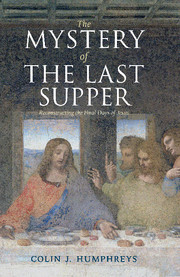Book contents
- Frontmatter
- Contents
- List of illustrations
- Foreword by I. Howard Marshall
- Acknowledgements
- 1 Four mysteries of the last week of Jesus
- 2 Dating the crucifixion – the first clues
- 3 The problem of the last supper
- 4 Can we reconstruct the Jewish calendar at the time of Christ?
- 5 The date of the crucifixion
- 6 The moon will be turned to blood
- 7 Did Jesus use the solar calendar of Qumran for his last supper Passover?
- 8 Does ancient Egypt hold a key to unlocking the problem of the last supper?
- 9 Discovering the lost calendar of ancient Israel
- 10 Was the lost ancient Jewish calendar used in Israel at the time of Jesus?
- 11 The date of the last supper: the hidden clues in the gospels
- 12 From the last supper to the crucifixion: a new analysis of the gospel accounts
- 13 A new reconstruction of the final days of Jesus
- Notes
- Bibliography
- Index of biblical and other ancient sources
- General index
9 - Discovering the lost calendar of ancient Israel
Published online by Cambridge University Press: 03 May 2011
- Frontmatter
- Contents
- List of illustrations
- Foreword by I. Howard Marshall
- Acknowledgements
- 1 Four mysteries of the last week of Jesus
- 2 Dating the crucifixion – the first clues
- 3 The problem of the last supper
- 4 Can we reconstruct the Jewish calendar at the time of Christ?
- 5 The date of the crucifixion
- 6 The moon will be turned to blood
- 7 Did Jesus use the solar calendar of Qumran for his last supper Passover?
- 8 Does ancient Egypt hold a key to unlocking the problem of the last supper?
- 9 Discovering the lost calendar of ancient Israel
- 10 Was the lost ancient Jewish calendar used in Israel at the time of Jesus?
- 11 The date of the last supper: the hidden clues in the gospels
- 12 From the last supper to the crucifixion: a new analysis of the gospel accounts
- 13 A new reconstruction of the final days of Jesus
- Notes
- Bibliography
- Index of biblical and other ancient sources
- General index
Summary
The Lord said to Moses and Aaron in Egypt, ‘This month is to be for you the first month, the first month of your year.’
(Exodus 12:1–2)As we saw in the previous chapter, the calendar expert Professor Bickerman stated, ‘The pre-Babylonian time reckoning of the ancient Hebrews is virtually unknown’, and the Jewish scholar Sacha Stern wrote, ‘We return to the pre-exilic period … calendar reckoning in the early biblical period remains completely obscure.’ In this chapter we will find this ‘lost calendar’ of early Israel.
According to the book of Exodus, God instructed Moses and Aaron to change the first month of the calendar they were using so that the Exodus from Egypt marked the start of their new year. This was the only change in the calendar they were asked to make. Interestingly, Exodus pointedly states, ‘The Lord said to Moses and Aaron in Egypt, “This month is to be for you the first month”’ (Exodus 12:1–2). The readers of Exodus would have been well aware that Moses and Aaron were in Egypt; Moses and Aaron had been there throughout the ten plagues of the previous seven chapters of Exodus, so why specifically mention that they were in Egypt here, immediately before making a calendrical statement? I suggest the reason is explicitly to draw readers' attention to the fact that Moses and Aaron were in Egypt and therefore using an Egyptian calendar, the first month of which Moses was now to change.
- Type
- Chapter
- Information
- The Mystery of the Last SupperReconstructing the Final Days of Jesus, pp. 121 - 134Publisher: Cambridge University PressPrint publication year: 2011



